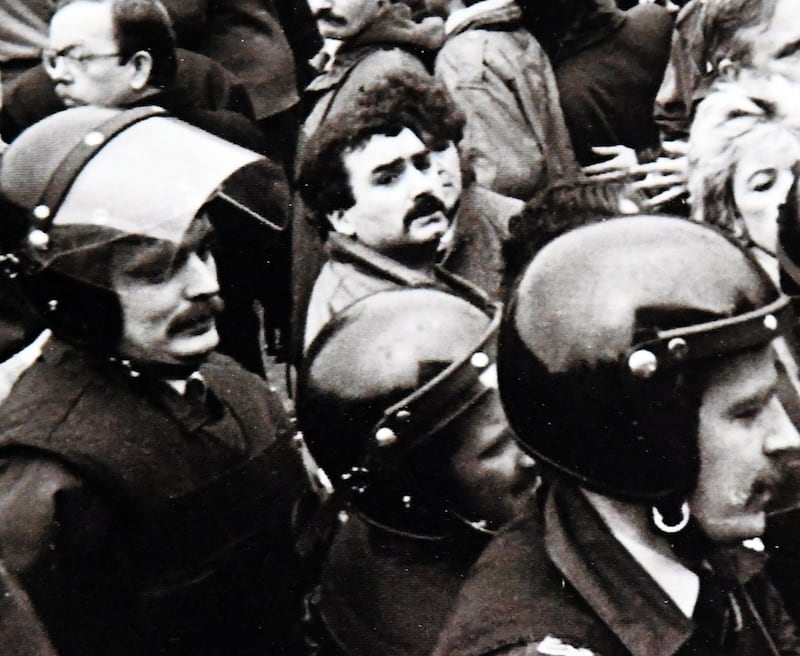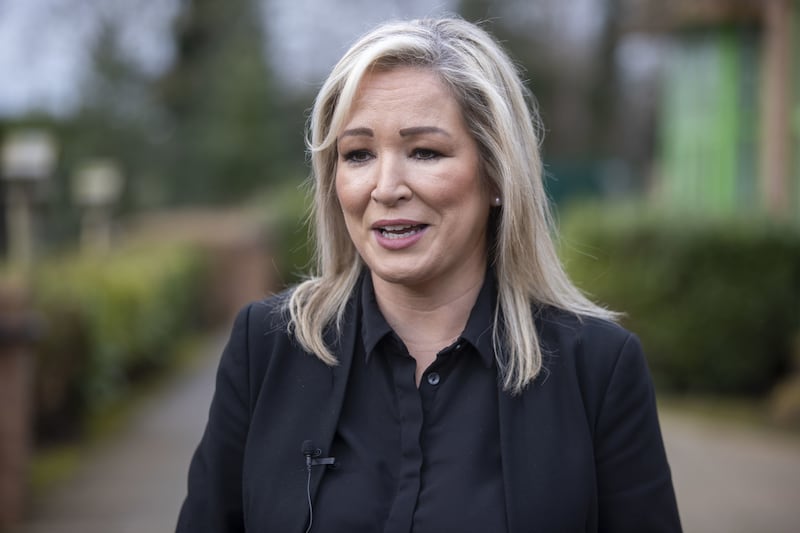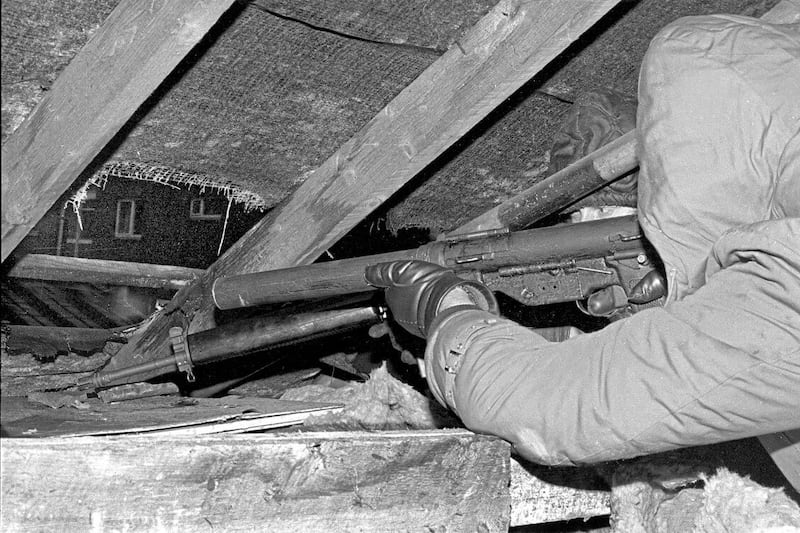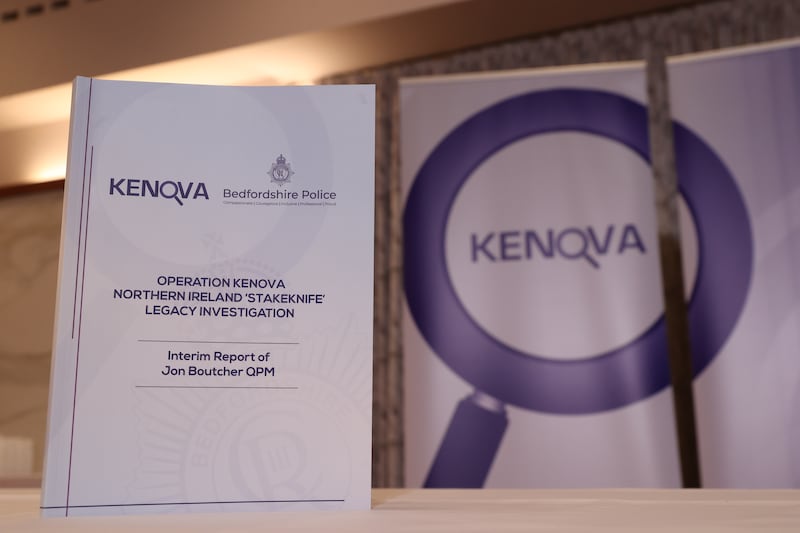Operation Kenova, a major independent investigation into Stakeknife - the British Army’s top agent inside the IRA’s internal security unit - has concluded that running the agent probably resulted in more lives being lost than saved.
The newly published report by Jon Boutcher, who is now Chief Constable of the PSNI, does not identify the double agent believed to be Freddie Scappaticci.
However, the man who was the former commander of the IRA’s Internal Security Unit (ISU), which was responsible for hunting down suspected informers and agents, is described as “inextricably bound up with and a critical person of interest at the heart of Operation Kenova”.
Scappaticci died of natural causes last year in England aged 77..
The report says: “It will never be known whether he would have been prosecuted and, if so, pleaded guilty or been convicted at trial, but it is my view that he could and should have been,” said the report, which was released on Friday.
“I believe that we found strong evidence of very serious criminality on the part of Mr Scappaticci, and his prosecution should have been in the interests of victims, families and justice.”
The report acknowledges that Stakeknife, who has been linked to multiple murders, was “undoubtedly a valuable asset who provided high-quality intelligence about the Provisional IRA at considerable risk to himself”.
The report says information from the agent was not always acted upon.
It estimates lives saved by the intelligence was at most in low double digits and that his continued operation as an agent likely resulted in more lives being lost than saved.
Kenova report critical of IRA
The report also makes scathing comments regarding the IRA, describing it as “an organisation based on intimidation and violence towards society in general, the security forces especially, and indeed often the very people it claimed to represent and protect.
“Throughout the Troubles, PIRA did not take full responsibility for all its actions and was not honest with those it claimed to be fighting for.”
Speaking at a press conference today Jon Boutcher said Stakeknife was involved in “very serious and wholly unjustifiable criminality, including murder”.
He said a lack of legal framework to govern the use of agents during the Troubles created a “maverick culture” where agent handling was considered a high stakes “dark art” that was practised “off the books”.

Mr Boutcher paid tribute to the families impacted by the Kenova investigation.
“Many of these families have endured delays, setbacks and unfulfilled promises in their quest for the truth,” he said.
“Their strength, determination and dignity over the many years is the most inspirational aspect of legacy and a lesson to all of us”.
Stakeknife: ‘This should not have happened’
Mr Boutcher said his overriding mission was “delivering the truth” to families who have been made to “endure endless delays”.
He told affected families: “You are not mad, this was happening and this should not have happened.
“Murders that should and could have been prevented were allowed to take place.”
Mr Boutcher said the Kenova investigation had encountered difficulties accessing information from state agencies and spoke of attempts to undermine their work.
He also expressed surprise at the length of time it took the Public Prosecution Service (PPS) to make prosecutorial decisions in the case.
He revealed that on the day his team was due to deliver its first tranche of evidence files to the PPS in October 2019, MI5 informed them that the building’s security accreditation had expired.
Mr Boutcher said it was not until February 2020 until the accreditation was restored and the files could be delivered.

The PSNI chief constable later speculated whether a prosecution could have potentially been brought against Freddie Scappaticci before he died.
He said the PPS had been considering evidence files that contained strong evidence of very serious criminality on the part of Scappaticci prior to his death.
“We first attempted to submit these in October 2019 and it will never be known whether an earlier decision on them by PPSNI would have result in prosecution and, if so, conviction,” he said.
Full report into Troubles figure should be published
Confirming Stakeknife was a single person, Mr Boutcher said the agent’s claims about saving countless lives had been “hugely exaggerated”.
His actions “resulted in more lives being lost than were saved”, he continued.
Mr Boutcher said the British government should now authorise the publication of his identity and the “full unredacted report”.
“The United Kingdom government should apologise” to the families for their handling failures, he added.
Mr Boutcher said the use of agents undoubtedly saved lives during the Troubles. However, he said there were occasions when preventable crimes were allowed to happen and went unsolved as a result of efforts to protect agents.
He identified several cases of murder where the security forces had advance intelligence but did not intervene in order to protect sources.
He acknowledged the “exceptional stressful” operating climate the security forces worked in, and said handlers often faced dilemmas where there was “no right answer”.

The report said mistakes and questionable decisions were “inevitable and understandable”.
“State agents do need to be protected through anonymity and secrecy, but that protection cannot confer de facto immunity or a right to act with impunity as that would be wholly incompatible with the rule of law and human rights,” the report said.
“Agents may sometimes engage in criminal conduct, but they do not have a free licence to break the law and should not be led to believe otherwise.”
Mr Boutcher said the state’s “absolutist approach” to agent anonymity may have led to other individuals losing their lives.
He said the NCND policy seems to have assumed a “totemic status” within government and the security forces and has become an “implacable dogma or mantra with the qualities of a stone wall”.
He said there should be a review in relation to its “routine application” in Troubles cases to ensure it is not allowed to “obscure wrongdoing by the security forces or serious criminality by agents”.
Asked about whether agents might be operating for the British government in a similar way today, Mr Boutcher said he hoped the modernisation of policing would prevent it.
Stakeknife ‘owed no gratitude’
He continued: “These types of activities should never happen in the United Kingdom today.”
A lack of operating framework at the time made for a “uniquely dangerous” situation, he added.
Paying tribute to those who helped with the report’s investigation, he said: “Each person we spoke with helped shape and inspire the work of Kenova.
“What each legacy victim has endured should be acknowledged.
“I don’t believe Stakeknife is owed any debt of gratitude.”
Responding to the publication today, Secretary of State Chris Heaton-Harris said the British government could not comment on the detail of the report until the final version was published.
“There can be no doubt that the way Operation Kenova has conducted its work since being commissioned in 2016 has gained the trust of many families who have long been seeking answers as to what exactly happened when their loved ones were so brutally murdered by, and on the orders of, the Provisional IRA,” he said.
“Over 3,500 people from all parts of the community were killed during the Troubles and tens of thousands more injured. Over 1,000 of those killed were members of the security forces. Their bravery, courage, dedication and sacrifice in seeking to uphold democracy and the rule of law must never be forgotten.
“We must remember too that the vast majority of deaths during the Troubles, around 90%, were perpetrated by terrorist organisations - in the substance of this report, by the Provisional IRA.
“As this is an ‘interim’ report, I will not comment at this time on behalf of the government on the detail of the report. It contains several specific, very serious allegations that remain subject to consideration by the courts.
“It would not be right for the government to make any comment on the substance of the Interim Report until the conclusion of litigation related to it. I note the recent decisions made by the Public Prosecution Service for Northern Ireland in relation to files passed to them by Operation Kenova, which once again go to show how difficult it is to achieve criminal justice outcomes in legacy cases. Due to numerous related civil cases, however, that remain ongoing, it would be inappropriate to comment further at this time. There is also the prospect of appeals against any of the recent decisions made by the Director for Public Prosecutions for Northern Ireland.
“I would like to put on record again my deepest sympathy with all the families who lost loved ones during the Troubles - including as a result of the actions of the Provisional IRA.”
First Minister Michelle O’Neill has said she is sorry for all lives lost during the Troubles.
Reacting to today’s report, Sinn Féin’s Stormont leader said the hurt of political violence cannot be disowned by republicans.
Ms O’Neill said: “The injustices and the tragedies of the past have left a deep legacy of suffering and trauma right across our society.
“We must never forget those who have died or been injured and their families. I am sorry for all the lives lost during the conflict without exception. Regrettably the path cannot be changed or cannot be undone.
“Neither can the suffering, the hurt or the political violence of conflict be disowned by republicans or by any other party to the conflict.
“People’s lives from every section of the community were trespassed upon during the conflict by British state forces, republicans, loyalists, and unimaginable grief and hurt and pain and suffering was inflicted.
“I would never ask any mother, father, wife, husband, son, daughter, brother or sister to forget the past or to move on. While thankfully the conflict is long over, the legacy of our past remains unresolved.”
Sinn Féin apology to families of alleged informers
Ms O’Neill also apologised to the families of alleged informers who were killed by the IRA.
Asked if she accepted that the murder of alleged informants was wrong and if she wanted to take the opportunity to apologise to their families, Ms O’Neill said: “Yes, I’ve said it before and I’m going to repeat it again today for all those families out there that lost a loved one.
“I am sorry for every single loss of life and that is without exception.
“That’s for every person who was hurt or impacted by our conflict.
“I think it’s important that today as the Sinn Féin new generation, Good Friday Agreement generation, that I would repeat that for those families.
“I can only hope - because this is ultimately their day - that they can take some comfort from that.”
Ms O’Neill said she is “wholeheartedly committed” to healing the wounds of the past.
She said: “Inter-generational trauma continues to impact so many families decades later.
“I represent the Good Friday Agreement generation.
“A generation that was born into conflict but who are now in a position, because of that agreement 26 years ago, to build the future in a time of peace.
“This is something that we can never ever take for granted. The hurt and pain caused must never again be repeated and we must always continue to find ways to help people to heal.
“As a republican and a Sinn Féin leader and also as first minister, I am wholeheartedly committed to healing the wounds of the past, to building this better future that each and every one of us deserve.”
An apology from the British government “should be forthcoming” following the interim findings of Operation Kenova, First Minister Michelle O’Neill said.
She said: “I think the report speaks to the need for an apology and I think that that should be forthcoming from the British Government.”
Additionally asked if she believed it was feasible that the IRA could make an apology, Ms O’Neill said she could only speak as Sinn Fein vice president.
She added: “We all know the IRA have left the stage.
“What I wanted to do today in terms of responding to the report is speak directly to all those families out there.
“That I’m so sorry that we were born into conflict, that I’m so sorry that people were hurt, and that I am determined to try and look towards the future and build a better future for us all, because I think we all deserve that.”
British state and IRA ‘co-coinspirators’
Solicitor Kevin Winters said victims were left with the conclusion from the Operation Kenova investigation that the state and the IRA were “co-conspirators” in the murder of citizens.
Mr Winters, who represents a number of families of victims, said the report was a “damning indictment on the state”.
He said: “The staggering takeaway message is that the state could have and should have intervened to save lives.
“That this didn’t happen is legally and morally reprehensible.
“The findings point to the existence of a macabre joint enterprise between the Force Research Unit (FRU), the TCG (Tasking and Co-ordination Group) and those who actually fired the shots.
“We are left with the horrendous conclusion and takeaway message that both the state and the IRA were co-conspirators in the murder of some of its citizens.”
DUP reaction
DUP leader Sir Jeffrey Donaldson questioned whether the £40 million spent on the investigation could have been better spent resourcing proactive policing in Northern Ireland.
“The work of the police, army or the security services was a just cause. Their job was to undermine terrorists,” he said.
“The fact that the security services had so many agents working at the top of the PIRA, is testament to their success. Whilst having lessons to learn for the government, the report reminds us that the intelligence agencies had infiltrated the PIRA to such an extent that they rendered the organisation almost inoperable.
“Working within the security forces was a role of honour in the Troubles. It was a courageous role undertaken by people who wanted to defeat terrorism, protect the entire community, and secure peace for us all. Whilst some will want to rewrite history and develop their own narrative of the past which blames those who tried to uphold the law as much as the terrorists, this is a distortion of reality.
“90% of the deaths in the Troubles were perpetrated by terrorists. We must remember that the soldiers were on our streets because of the terrorist campaign.
“£40 million is a huge bill to investigate the activities of one agent in the PIRA. It begs the question if that money might have been better spent on proactive policing today. It is even more disappointing that on the back of such an expensive investigation, the PPS has failed to secure a single prosecution.
“In the coming days, we will be asking more questions of those tasked with making decisions about Troubles related prosecutions in Northern Ireland. Where evidence exists against terrorist perpetrators, innocent victims must not be denied access to justice. This principle cannot be compromised.”
Downing Street said it would not comment on the report published by Operation Kenova until the inquiry had completed its work.
A Number 10 spokeswoman said: “We would want to extend our deepest sympathies with all the families who lost loved ones during this very dark period in Northern Ireland and it’s important we do not forget the thousands of victims, their families and neighbours from all communities who have suffered as a result.
“On this interim report, it would not be right to comment on the substance of it while it is an interim report.
“We will respond in full in due course following the full and final report and also following the conclusion of litigation which is related to the substance of this report.”
Stormont Justice Minister Naomi Long said: “I welcome the publication today of the Operation Kenova interim report.
“Investigating legacy issues can be very challenging and time consuming for all involved and can be painful and distressing for those directly affected.
“This has been a long and difficult journey for those families seeking the truth about what happened to their loved ones.

“I sincerely hope that today brings some measure of comfort for them and that they find some value in the interim report. No doubt everyone involved will wish to take time to fully understand the contents and any associated implications for them.”
Freddie Scappaticci: interned alongside Gerry Adams
Born around 1946 and brought up in the republican Market area of Belfast, Alfredo Scappaticci was the son of an Italian immigrant, Daniel, who ran a chip shop and ice-cream van.
By the age of 16, Nottingham Forest offered him the chance to become a professional footballer but he returned home within weeks.
Working as a bricklayer, he joined the IRA at the start of the Troubles and by 1971 found himself interned in Long Kesh alongside Gerry Adams and other republican leaders.
Released in 1974, he rose through the ranks of the IRA before being arrested for VAT fraud.

How and when the security services recruited him is unclear, but the theories include a reprieve from VAT charges, that he approached the security services after republicans beat him up for having an affair with an IRA member’s wife and that he became a drinking buddy with a young army officer.
In 2018, he was convicted in London of two counts of possessing extreme pornography which included images of animals but it is unknown if this perversion had been used against him by his handlers in the past.
What remains clear is that by the early 1980s he was in the pay of the notorious military intelligence outfit, the Force Research Unit (FRU).
At the time, republicans wary of infiltration and informers had set up the IRA’s internal security unit or nutting squad.
As the head of the unit, Scappaticci routinely tortured suspects in safehouses for days at a time in return for confessions.
With the victims stripped, beaten, blindfolded and hung upside down, he is reported to have once said: “Everybody has a breaking point and thinks they’re going home. But they don’t.”
Security sources have attempted to defend their use of their “golden egg,” with information from Scappaticci said to have saved lives by stopping major IRA operations including an IRA attack on the British army in Gibraltar.
Questions remain, however, on allegations his handlers knowingly sacrificed lives in order to protect their source in the IRA.








